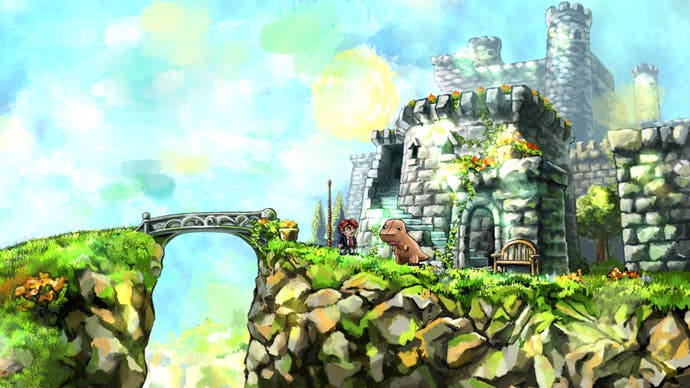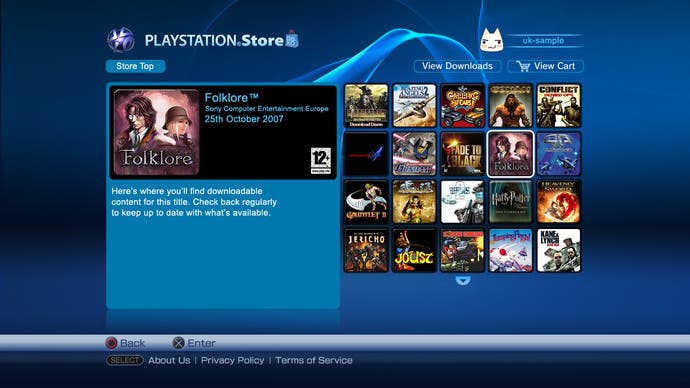XBLA vs. PSN vs. WiiWare/Virtual Console
We've played everything on them, so which is best?
Sony's relatively slow start in the realm of downloadable gaming means that it's not even close to offering the same bulk, but that may not be a bad thing. The early titles were a mixed bunch, with fairly generic games like Snakeball, Feel Ski and High Velocity Bowling all suggesting a console trying to find its virtual voice. Fast forward to now, and titles like Super Stardust, LocoRoco, echochrome and the PixelJunk series feel much more cohesive and suggest Sony is staking its claim as the home of stylish casual gaming. It's also notable that the PS3 is the first console to start delivering larger games via download, with recent well-received games like Ratchet & Clank: Quest For Booty and Siren: Blood Curse snuggling into the gap between impulse buy downloads and full-priced retail games. The trickle of PSone classics, meanwhile, ensures there's a solid bedrock of the ubiquitous racers, platformers and shooters to be found. There may not be as many titles to scroll through, but the PS3 covers its bases well.
Advantage: Xbox 360 and WiiPrice and value
The PS3 has the clear lead here. Not only because its prices are the lowest, on average, but because they're spelled out in actual local currency rather than hiding the cost behind the velvety curtain of a pre-paid points system. Pricing PSone games at just GBP 3.49 (or EUR 4.30), and making them cross-compatible with both PS3 and PSP, is one of Sony's most commendable decisions - particularly when compared to Nintendo and Microsoft's prices for retro emulations. Sony has a broader spread of prices - one of the advantages of dealing in real money - but this also reflects the move into offering more substantial titles and episodic games. Original new games generally come in around the GBP 4.99 - 6.99 (EUR 6.18 - 8.66) while their mid-range games are usually about half the price of a full retail game.
The one thing you could always say about Microsoft's pricing was that it was steady and reliable. Points are purchased in fixed amounts, with 100 Points equalling roughly 85p in British money, or EUR 1.20. Traditionally, there were just two price points for Live Arcade games - 400 points and 800 points. Things aren't so certain anymore though, with Penny Arcade bumping the price up to 1600 Points, and Puzzle Quest, Braid and Castle Crashers all commanding a premium 1200-Point cost. The latter three games fully justify their price - and it'd be a churlish fool who'd demand independent developers cut their margins just to satiate our modern tendency to demand more for less - but the knock-on effect is noticeable. The 400-Point price tag has all but vanished from the Game Store, with only four games so far this year using the lowest available price tag. There are, of course, occasional promotions when prices are lowered for a selection of titles, but this is too infrequent and random for it to have any real impact on the overall Live Arcade price picture.

Nintendo really suffer in this area, with a rigid price structure for the Virtual Console that bases the value of titles on the platform they appeared on. 100 Nintendo Points have a value of roughly 70p, or EUR 1.00. The cheapest games, released on the NES, SEGA Master System or Commodore 64, cost 500 Points. At the opposite end of the scale, Nintendo 64 games cost 1000 Points and Neo Geo games are apparently worth 900 Points. The problem with this system is clear - for no logical reason, a terrible N64 game will cost twice as much as, say, The Legend of Zelda, simply because of the platform it came out on.
And then there's Nintendo's shocking habit of bumping prices up by 100 Points for their Hanabi Festivals, which make previously unreleased Japanese and US games available for the first time in Europe. We know these are just emulated ROMs, we know the files themselves are not "rare" in any measurable way, and yet we're still expected to pay over the odds. WiiWare seems to be falling into a similar trap, with too many games automatically lunging for the 1000-Point price bracket even when their content doesn't warrant such an investment (Pokémon Ranch, we're looking at you). The best games on the Wii Shop are worth the money, but there's no escaping the feeling that prices on the whole are generally too high and poorly applied.
Advantage: PS3
Ease of use

Another area where Sony is making valuable strides is in the accessibility of its online store. Available via the PS3 or via the internet, it offers a shopping experience like any other online retailer, complete with shopping basket, order confirmation and checkout. Despite a redesign in April the thumbnails can still be a bit slow to load, and more ways to search and order the items would be most welcome, but on the whole the PSN shopping experience is an extremely pleasant one. The only glaring omission is the option to download a demo of all new games. At present, only certain games offer a demo, but there's no insistence from Sony that developers offer this.
Of course, mandatory trial versions are just one of the stipulations handed down by Lord Microsoft for XBLA games, but apart from that important distinction the Xbox 360 Game Store boasts broadly similar features to Sony's. Although, having been around a bit longer, it's long overdue for its upcoming dashboard makeover. Those swishing tabs are getting a bit sluggish with all the info they now carry, making navigation a chore. You won't struggle if you're just looking for the latest releases, but any new owners trying to pick their way through that big pile of titles isn't going to have much fun browsing the outdated system. But it's being replaced, sooner rather than later, so it's silly to grumble about it here.








